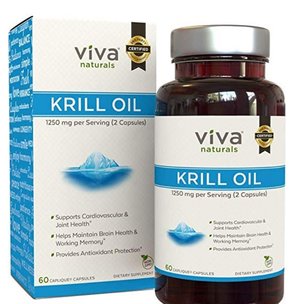The link between fish oil and heart disease has been extensively researched for many years. An adequate daily supply of omega 3 fatty acids in the form of fish oil supplements is crucial to optimum physical and mental health.
Benefits include better immune function, less degenerative disease, increased fertility, improved mental health and healthier skin.
But over and above all else, what fuels the popularity of omega 3 fatty acids is the fact that several studies have proved the positive effects of fish oil for heart health and longer life.
Fish oil lowers triglyceride levels and reduces heart disease risk. One study published in August 2000 in the American Journal of Clinical Nutrition on post-menopausal women monitored their fish oil intake and found that those who ate more of the omega 3 rich oil had 25% less risk of developing heart disease than those taking a placebo.
Omega 3’s are absolutely life-saving!
In a Journal of the American Medical Association report, following 20,000 men over 11 years, it was found that there was a 50% reduction in risk of sudden death from a heart attack in those who ate fish one or more times a week. What’s more, when the population ate more fish, this beneficial effect increased further!
That wasn’t the only study in support of the effect of fish oil for heart health. Lancet published a paper that showed fish eaters reduce their post heart-attack risk of sudden death by 29% and a Dutch trial involving over 550 men focused on the benefit of fish oil for preventing stroke.
One study published in August 2000 in the American Journal of Clinical Nutrition on post-menopausal women monitored their fish oil intake and found that those who ate more of the omega 3 rich oil had 25% less risk of developing heart disease than those taking a placebo.

Fish Oil Is Good For Your Heart
All this data is conclusive in proving the value of fish oil for heart healthy living. Fish oil is the best source of critical long-chain omega fatty acids like DHA and EPA. 3 grams a day of fish oil provides 1 gram of DHA and EPA, which is all you need.
Pharmaceutical grade fish oil supplements prepared by molecular distillation out of fresh fish caught in cold, clean waters far from marine shipping lanes gives by far the best quality fish oil for supplementation.
If you’d like to learn more about the EPA and DHA rich fish oil supplements that can significantly lower the risk of heart disease and promote healthy living, then you should check out this free report that casts the spotlight on the multiple factors you must consider before choosing an omega 3 fish oil supplement. To read this report, click here.
Fish Oil and Cholesterol – What Effect Does It Have?
There is a long and convoluted history around the issue of fish oil and cholesterol, specifically how fish oil affects blood levels of the substance and what benefits it confers upon those who take it consistently.
While some people may be aware of the relationship between fish oil and cholesterol, others may not have any idea about what impact fish oil has on the cholesterol levels in their body. In this article we will take a closer look at this equation.
Fish oil helps to control bad cholesterol
People who have heart problems and want to prevent strokes or heart attacks often consume fish oil to keep their cholesterol under control. Fish oil lowers bad cholesterol while increasing good cholesterol in your bloodstream. The reaction between fish oil and cholesterol is such that only a slight amount of its supplement can reduce triglyceride levels significantly.

Fish oil helps to keep the arteries healthy
If there is excessive build-up of plaque on the walls of your arteries, they are more likely to crack and lead to fatal problems. Fish oil helps to cleanse the walls and prevents plaque from forming. Not only that, but fish oils also keep the arteries strong, healthy and much more elastic, thus preventing them from cracking.
Fish oil helps to increase good cholesterol
In the battle between good cholesterol and bad cholesterol, fish oil helps the former to win. All the healthy fatty acids in fish oil pump up the count of good cholesterol in the system while curbing the count of bad cholesterol. This eventually helps to keep the heart healthy and safe.
Fish oil helps to slow down the build-up of plaque
Fish oil and cholesterol react in such a way that the build-up of plaque is slowed down significantly. When cholesterol around the arteries hardens and oxidization takes place, the chances of suffering a heart attack also increase. Fish oil keeps the cholesterol from hardening and can thus save you from suffering a stroke or heart attack.
Apart from this association between fish oil and cholesterol, omega-3 fatty acids also offer other health benefits. Since it has the impact it does on cholesterol, fish oil is known to improve the condition and functions of the heart. By increasing the metabolism rate of your body, fish oil also plays a significant role when you wish to lose weight.
It has shown to reduce the risk of certain cancers like breast cancer, prostate cancer and colon cancer. It treats inflammations and thus people suffering from arthritis can also benefit from omega-3 fatty acid supplements. Last but not the least, fish oil has been seen to improve bad moods as it sorts out chemical imbalances in the brain and helps to stabilize emotions.
More about choosing the right type of fish oil can be found in this free special report that will guide you towards picking your ideal brand. Click here to read it.
Can Fish Oil Really Lower Cholesterol?
There’s a buzz about the ability of fish oil to lower cholesterol. Here are the facts.
Fish oil, rich in omega-3 fatty acids, are polyunsaturated fats found in fresh fish, fish oil and other forms of fish supplements. They primarily consist of eicosapentaenoic acid (EPA) and docosahexaenoic acid (DHA) that are known for their several health benefits.
Health Benefits of DHA and EPA
One of the major health benefits of EPA and DHA is that they restrict atherosclerosis that is known to cause different heart diseases. Research studies have shown that consuming omega-3 fatty acids can reduce the risk of heart diseases and improve lipid profiles. It is thus advisable that one consumes fish oil to lower cholesterol and triglyceride levels.
The dosage of fish oil used in these research studies range from 900 mg and 5 grams each day which means that one would have to consume plenty to fish to achieve this quantity. Since that is not as feasible, fish oil supplements are prescribed to people who have a deficiency of the same.
The studies have shown that consuming 900 mg of fish oil on a daily basis can help to reduce four percent triglyceride levels within six months. However this decrease is also dependent on a healthy diet so one must make sure he does not compromise on that front while ingesting fish oil to lower cholesterol.

Are You Taking Omega 3 Fatty Acids Yet?
Omega-3 fatty acids are easily available at most nutritional stores and local pharmacies and you need not necessarily have a prescription to get yourself a bottle of the supplement. As little as one gram of fish oil supplementation each day can help to reduce triglycerides and prevent sudden death from heart attacks.
On average, those who have high levels of triglyceride usually ingest four grams of fish oil to maintain a healthy level of cholesterol in their system. If one has a medical history of heart diseases within the family, it is a good idea that he consumes fish oil to lower cholesterol levels and prevent any unforeseen damage.
If you do not know whether to buy over-the-counter fish oil supplements or prescription omega-3 fatty acids, you must know that the latter contains a definite amount of DHA and EPA, is purified and has absolutely no contaminants. On the other hand, the former does not have to undergo such stringent purification processes even though it offers similar benefits.
Even though it is a good idea to purchase supplements of fish oil to lower cholesterol, it is best to do so after speaking with a healthcare professional as high doses of omega-3 fatty acids makes it difficult for blood to clot and can also cause you to bleed more easily.
Get more information about choosing and finding the best brand of fish oil to lower cholesterol and provide many more health benefits. Check out this short special report – click here now.
Fish Oil for Triglyceride Control – The Real Facts
An adequate daily supply of omega 3 fatty acids confers multiple health benefits upon you. Meeting your daily requirements of omega 3 is indeed crucial to optimum physical and mental health, especially in preventing (even reversing) heart disease.
Omega 3 fats reverse heart disease, boost immune function, fight degenerative disease, help increase fertility, improve mental health and promote healthy skin.
Numerous studies have shown that there are benefits from taking fish oil supplements for triglyceride levels that are above normal. High blood triglyceride increases risk of heart attacks, and their control is an important thrust of primary prevention of heart disease.
How to Lower Triglycerides?
Triglyceride levels can be reduced by cutting down on consumption of fats, alcohol and simple carbohydrates. Omega 3 fatty acides, particularly EPA and DHA, help further in bringing down levels.
Fish oils for triglyceride control act in a roughly dose dependent manner, with more fish oil intake being better. Taking 4.5 grams of EPA and DHA brought down triglyceride levels by upto 39%

A pharmaceutical grade fish oil preparation containing the long-chain omega-3 fatty acids has been used in Europe both for research projects and as a prescription drug. Recently the FDA approved essentially the same product for use in the USA for treatment of moderately elevated triglycerides (150-500 mg/dL).
Fresh fish is the best source of omega fatty acids, yet the most likely to be contaminated with PCBs, DDT and dioxin, along with heavy metals like mercury. Investigators of a study linking fish consumption to breast cancer warned “Fish is not merely a source of omega 3 fatty acids, but also of methyl mercury.”
An option that allows you to enjoy the benefits of fish oil, without the risks, is to take fish oil capsules. Several brands use oil from fish caught in the cleanest and coldest waters like off coastal New Zealand where contamination is rare. This is made safer by molecular distillation which removes any mercury or other heavy metals, dioxins, PCBs and other contaminants from the oil. Learn more about this in a free report here.
The Magic of Fish Oil for Blood Pressure Control
While the underlying cause of primary (essential) hypertension is not known, what has been confirmed over many studies by researchers is that high blood pressure is a significant risk factor for heart disease and stroke.
A review by the American Heart Association concluded that fish and fish oils help prevent cardiovascular disease including fatal and non-fatal heart attacks, strokes, sudden cardiac death, and coronary artery disease (angina).
Fish and fish oils contain long-chain polyunsaturated omega-3 fatty acids, more specifically, eicosapentaenoic acid (EPA) and docosahexaenoic acid (DHA). The average American diet contains only about 100-200 mg/day of EPA and DHA. The diet also contains about 1.4 grams/day of alpha- linolenic acid mainly from canola and soybean oils.
But until recently there was not enough evidence for the mainstream medical community to recommend taking fish oil for blood pressure reduction.
That has however changed in light of findings reported in a 1993 meta-analysis of 31 placebo-controlled trials that studied fish oil for blood pressure control. In all, the studies were carried out on 1356 subjects, and examined the effect of omega-3 fatty acids in fish oil on blood pressure.
Analysis of the collective data suggested a strong correlation between both eicosapentaenoic acid (EPA) and docosahexaenoic acid (DHA) and a blood pressure response. The blood pressure of hypertensive subjects dropped in direct proportion to their daily intake of fish oil which was rich in omega 3 fatty acids.
It further appeared that this effect of fish oil on blood pressure was more manifest in those with high blood pressure (hypertensives) high blood cholesterol levels and atherosclerotic disease, rather than subjects with normal blood pressure.
Researchers at the University of Western Australia have also published results from a study of 63 men and postmenopausal women who were overweight and being treated for high blood pressure. They showed that weight loss combined with daily fish oil consumption is very effective in lowering blood pressure, triglyceride levels and increasing ‘good’ cholesterol.

The researchers concluded that this association was not a chance occurrence, and that a combination of weight loss and daily fish consumption significantly reduces the risk of cardiovascular disease among obese patients with high blood pressure.
Omega 3 fats, the kind you see in good fish oil, has been shown to reverse heart disease and have many other benefits. They boost immune function, fight degenerative disease, help increase fertility, improve mental health and promote healthy skin.
Fish oil is the best source of critical long-chain omega fatty acids like DHA and EPA, yet the most likely to be contaminated with PCBs, DDT and dioxin, along with heavy metals like mercury.
Taking fish oil capsules avoids these toxins. Top brands use oil from fish caught in the cleanest and coldest waters, preferably those far from commercial shipping lines and industrialized countries where the highest risk of water contamination by wastes exists. Making fish oil capsules even safer is the practice of molecular distillation.
You can learn more about the different factors that determine your choice of the best fish oil supplements in a short special report we’ve made available to our readers for free – click here to access it now.
Why Take Aspirin and Fish Oil Together?

Fish oil contains high amounts of omega three fatty acids, a kind of unsaturated fat which the body requires but cannot manufacture by its self. Omega 3 fatty acids are beneficial in protecting against chronic ailments. Apart from alleviating mild pain, aspirin is also prescribed in small doses to people predisposed to stroke or cardiac arrest.
Treating Heart Ailments
Using fish oil with aspirin might improve aspirin’s blood clot prevention effectiveness. Researchers have discovered that omega three fatty acids alone, do not prevent formation of blood clots however when consumed with aspirin, they improve aspirin’s ability to prevent formation of blood clot.
Eicosanoids Production
Taking fish oil supplements and aspirin together might enhance hormone levels. The body utilizes the omega three fatty acids contained in fish oil to manufacture eicosanoids. Eicosanoids are hormones which play an essential role in practically all important functions of the body. A recent scientific investigation revealed that patients who took a blend of aspirin and fish oil enhanced their eicosanoid amounts better than when they took aspirin alone.
Tips for Taking Aspirin and Omega 3 Fish Oil Supplements

Do not take aspirin on an empty stomach because it sometimes upsets the tummy when it is taken without food. If you are a breakfast person, you can take it with breakfast.
Tip #2
Your omega three fish oil supplement should be taken about twelve hours after taking the aspirin. It is okay to take fish oil before or after meals. The twelve hours interval between taking aspirin and fish oil is essential so as to decrease the risk of experiencing side effects.
Tip #3
Arrange to take your fish oil supplement at approximately the same time every day so as to maintain steady quantities in your body. Aspirin should also be taken in a consistent manner.
Tip #4
Go for medical checkup at least every 3 months. This will enable the doctor assess your state of health and find out if it is okay for you to continue taking fish oil together with aspirin.

Order Viva Labs Krill Oil : 100% Pure Cold Pressed Antarctic Krill Oil – Highest Levels of Omega-3s in the Industry
Taking aspirin and fish oil together might predispose you to excessive bleeding and can slow clotting of blood. Also, aspirin can cause side effects such as stomach pain, heartburn, and vomiting.
Before you take any supplements, always consult with your doctor. And be sure to review the free fish oil buyer’s guide here: click now.


